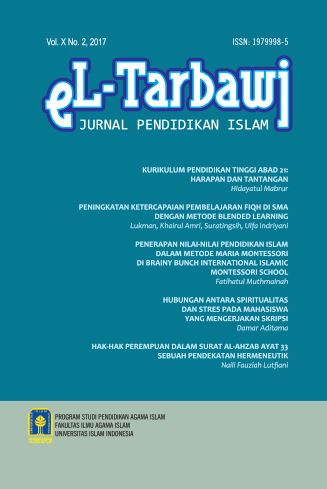Main Article Content
Abstract
This paper was intended to describe that it is highly recommended and important to have a sophisticated understanding of the qur’an al-Ahzab verse 33 concerning the rights of women to take action outside of domestic work such as career, social, and education. Because of the misunderstanding and misinterpretation of the Qur’anic text of al-Ahzab verse 33, there are still people with narrow paradigms that cause the enslavement of women in domestic household affairs only which is very contradictory to the moral message of the Qur’an. Therefore, this paper will present the moral message that is explicitly contained in the Qur’an al-Ahzab verse 33. The study deploys a descriptive- analytic method using hermeneutic methodology, and the data are gathered through library reviews. The study finds that in Qur’an al-Ahzab verse 33, women do not only have domestic duties as housewives, but also have rights to take part in the world of work or career, social world, and education. It has to be surely maintained to develop the potential of women as fellow servants of God who both have the potential and also at the same time play a role to help aspects of the family economy. What happened in some societies is an output from the interpretation of the normative or textual text of the Qur’an that makes a gap between men and women which excludes the message of ethics of the Qur’an that put forward the value of equality in a proportional context.
Keywords: Womens right, hermeneutics, equality
Article Details
Authors retain copyright and grant the journal right of first publication with the work simultaneously licensed under a Creative Commons Attribution (CC-BY-SA) 4.0 License that allows others to share the work with an acknowledgment of the work’s authorship and initial publication in this journal.
References
- Al-Barudi, Imad Zaki, Tafsir Wanita, Jakarta: Pustaka AL-Kautsar, 2010. Alqur’an Maghfirah, Jakarta: Maghfirah Pustaka, 2006. Arrifa’i, Muhammad Nasib, Ringkasan Tafsir Ibnu Katsir, Jakarta: Gema Insani, 2012.
- Ash-Shiddieqy, Teungku Muhammad Hasbi, Ilmu-Ilmu al-Qur’an (‘Ulum al-Qur’an), Semarang: Pustaka Rizki Putra, 2009.
- As-Suyuti, Jalaludin, Sebab Turunnya Ayat Alqur’an, Jakarta: Gema Insani 2008.
- Fahruddin Faiz, Hermeneutika Al-Qur’an, Yogyakarta: eLSAQ Press, 2005.
- Hatta, Ahmad, Tafsir Qur’an Perkata, Jakarta: Maghfirah Pustaka, 2009. K. Bertens, Filsafat Barat Abad XX, Jakarta: Gramedia, 1981. Kementerian Agama RI, Tafsir al-Qur’an Tematik: Kedudukan dan Peran Perempuan, Jakarta: PT. Sinergi Pustaka Pelajar, 2012.
- Palmer, Richard E., Hermeunetika Teori Baru Mengenai Interpretasi, Yogyakarta: Pustaka Pelajar, 2005.
- Saenong, Ilham B., Hermeunetika Pembebasan Metodologi Tafsir al-Qur’an menurut Hasan Hanafi, Jakarta, Teraju, 2002.
- Sahiron Syamsuddin, Studi Al-Qur’an (Metode dan Konsep), Yogyakarta: eLSAQ Press, 2010.
- Shihab, M., Quraish, Tafsir Al-Misbah, Jakarta: Lentera Hati, 2009. Shihab, M., Quraish, 1001 Soal Keislaman Yang Patut Anda Ketahui, Jakarta: Lentera Hati, 2008.
- Shihab, M., Qurais, Wawasan al-Qur’an, Tafsir Tematik Atas Berbagai Persoalan Umat, Jakarta: Lentera Hati, 1996.
- Sibawaihi, Hermeunetika Alqur’an Fazlurrahman, Bandung: Jalasutra, 2007.
- Sumaryono, E., Hermeunetik, Sebuah Metode Filsafat, Yogyakarta: 1999, Kanisius.
- Syamsudin, Sahiron, Hemeunetika dan pengembangan Ulumul Qur’an, Yogyakarta: Pesantren Nawasea Press, 2009.
- Syamsuddin, Sahiron, DKK., Hermeneutika Alqur’an: Madzhab Yogya, Yogyakarta: Penerbit Islamika, 2003.
- Ricoeur, Paul, Hermeunetika Ilmu Sosial, Yogyakarta: Kreasi Wacana Offset, 2012.
References
Al-Barudi, Imad Zaki, Tafsir Wanita, Jakarta: Pustaka AL-Kautsar, 2010. Alqur’an Maghfirah, Jakarta: Maghfirah Pustaka, 2006. Arrifa’i, Muhammad Nasib, Ringkasan Tafsir Ibnu Katsir, Jakarta: Gema Insani, 2012.
Ash-Shiddieqy, Teungku Muhammad Hasbi, Ilmu-Ilmu al-Qur’an (‘Ulum al-Qur’an), Semarang: Pustaka Rizki Putra, 2009.
As-Suyuti, Jalaludin, Sebab Turunnya Ayat Alqur’an, Jakarta: Gema Insani 2008.
Fahruddin Faiz, Hermeneutika Al-Qur’an, Yogyakarta: eLSAQ Press, 2005.
Hatta, Ahmad, Tafsir Qur’an Perkata, Jakarta: Maghfirah Pustaka, 2009. K. Bertens, Filsafat Barat Abad XX, Jakarta: Gramedia, 1981. Kementerian Agama RI, Tafsir al-Qur’an Tematik: Kedudukan dan Peran Perempuan, Jakarta: PT. Sinergi Pustaka Pelajar, 2012.
Palmer, Richard E., Hermeunetika Teori Baru Mengenai Interpretasi, Yogyakarta: Pustaka Pelajar, 2005.
Saenong, Ilham B., Hermeunetika Pembebasan Metodologi Tafsir al-Qur’an menurut Hasan Hanafi, Jakarta, Teraju, 2002.
Sahiron Syamsuddin, Studi Al-Qur’an (Metode dan Konsep), Yogyakarta: eLSAQ Press, 2010.
Shihab, M., Quraish, Tafsir Al-Misbah, Jakarta: Lentera Hati, 2009. Shihab, M., Quraish, 1001 Soal Keislaman Yang Patut Anda Ketahui, Jakarta: Lentera Hati, 2008.
Shihab, M., Qurais, Wawasan al-Qur’an, Tafsir Tematik Atas Berbagai Persoalan Umat, Jakarta: Lentera Hati, 1996.
Sibawaihi, Hermeunetika Alqur’an Fazlurrahman, Bandung: Jalasutra, 2007.
Sumaryono, E., Hermeunetik, Sebuah Metode Filsafat, Yogyakarta: 1999, Kanisius.
Syamsudin, Sahiron, Hemeunetika dan pengembangan Ulumul Qur’an, Yogyakarta: Pesantren Nawasea Press, 2009.
Syamsuddin, Sahiron, DKK., Hermeneutika Alqur’an: Madzhab Yogya, Yogyakarta: Penerbit Islamika, 2003.
Ricoeur, Paul, Hermeunetika Ilmu Sosial, Yogyakarta: Kreasi Wacana Offset, 2012.
